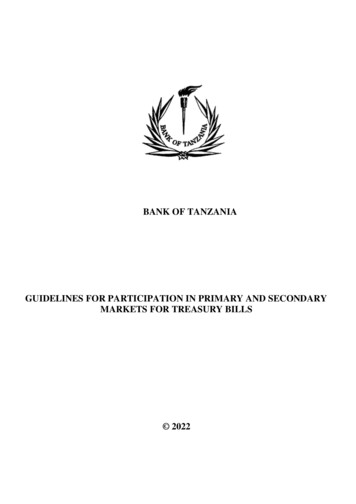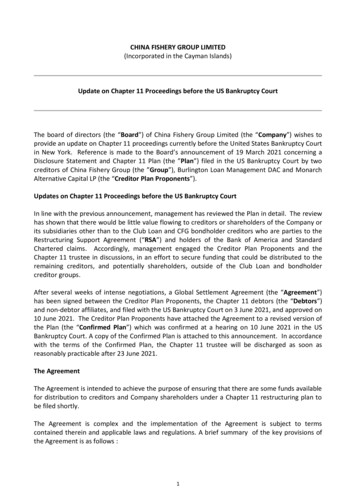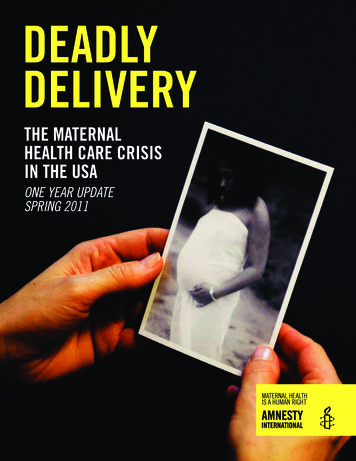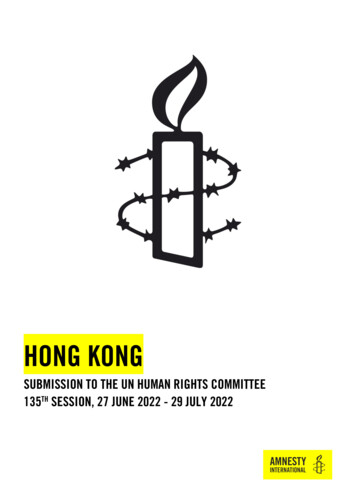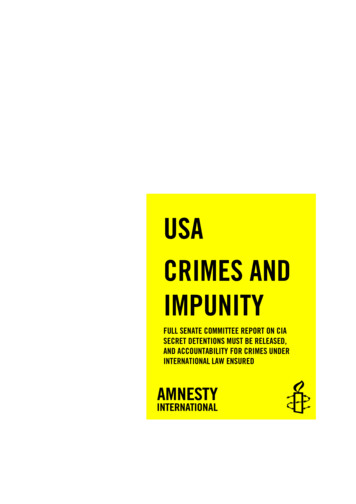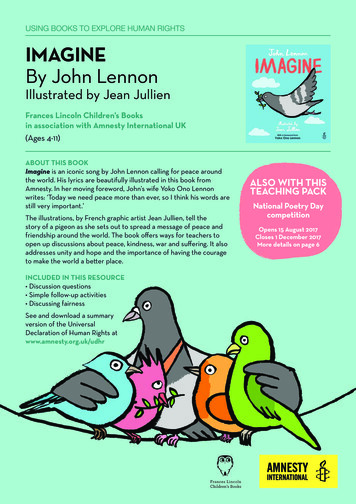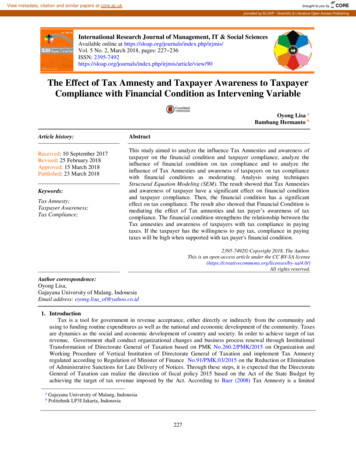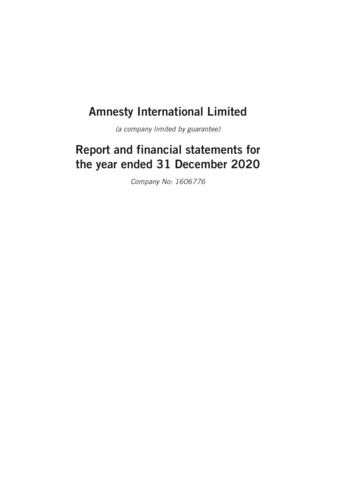
Transcription
Amnesty International Limited(a company limited by guarantee)Report and financial statements forthe year ended 31 December 2020Company No: 1606776
Amnesty International Limited(a company limited by guarantee)ContentsSectionPageLegal and Administrative details . 2Directors’ Report . .3Independent Auditor’s Report to the Members of Amnesty International Limited . .27Consolidated Statement of Financial Activities. .31Consolidated Balance Sheet . .32Consolidated Cash Flow Statement .33Notes to the Financial Statements . . .34
Amnesty International Limited(a company limited by guarantee)Legal and Administrative detailsDirectors:Vincent Adzahlie-MensahMaria de Lourdes Barrera-CamposSarah Jane BeamishPeter Petelo Fa’afiuFabiola Gutierrez ArceGreg MarshNolasco Ritz Lee III SantosAniket ShahAnjhula Mya Singh-BaisCo-opted members:Christoffer SchlaefferMichael BergmeijerSecretary General:Acting Secretary General:Agnès Callamard (appointed 29 March 2021)Julie Verhaar (resigned 26 March 2021)Company Secretary:Gayle Gedala (appointed 6 November 2020)Nigel John Armitt (resigned 6 November 2020)Address and Registered Office:1 Easton StreetLondon WC1X 0DWCompany Registration Number:1606776Date of incorporation:6 January 1982Constitution:Company limited by guarantee, with memorandum and articles ofassociationSolicitors:DLA Piper3 Noble StreetLondonEC2V 7EEBankers:Lloyds Bank plc10 Gresham StreetLondon EC2V 7AEAuditor:Crowe U.K. LLP55 Ludgate HillLondon EC4M 7JW2
Amnesty International Limited(a company limited by guarantee)Directors’ Reportfor the year ended 31 December 2020The Directors present their report on the affairs of Amnesty International Limited (“AIL”), which includesthe Strategic Report, together with the financial statements and auditor’s report for the year ended 31December 2020. The information required in a Directors’ Report is included in the Strategic Report. Thereport covers the activities of AIL and its subsidiaries, details of which are provided in Note 21 to thefinancial statements. Operationally, AIL is referred to as the International Secretariat of AmnestyInternational (“the IS”).1. Structure, Governance and Management1.1 Organisation StructureAmnesty International (“Amnesty”) is an unincorporated global movement which has as its objective “theenjoyment by everyone of all the human rights enshrined in the Universal Declaration of Human Rights andother human rights instruments throughout the world”.The Amnesty movement consists of 69 national entities (64 membership and 5 non-membership entities)and the IS. The work of the IS is undertaken by AIL and Amnesty International Charity (previously calledAmnesty International Charity Limited until 15 July 2020), both companies limited by guarantee registeredin England and Wales. Amnesty International Charity provides grant funding to AIL for the purposes of itscharitable activities, which are furthered, operationally, by the IS and Amnesty’s membership entities.Amnesty International Charity is a wholly owned subsidiary of AIL and is a registered charity. Due to thelegal restrictions associated with activities deemed political under the charity law of England and Wales,AIL is not registered as a charity. However, its Board of Directors took a decision in 2011 (reaffirmed in2021) to operate as a charity in all applicable respects, including complying with the Charities Act 2011and Accounting and Reporting by Charities: Statement of Recommended Practice applicable to charitiespreparing their accounts in accordance with the Financial Reporting Standard applicable in the UK andRepublic of Ireland (FRS 102), in preparation of AIL’s report and financial statements.The IS supports, enables and implements the work and functioning of the Amnesty movement by:····representing the movement externally through the Secretary Generalco-ordinating and conducting the movement’s global human rights work in research,campaigning, communications, advocacy, policy, legal, fundraising, education and otherfunctions as necessarydeveloping global strategy, policies and standards and ensuring their co-ordination,implementation, monitoring, evaluation and reporting; andsupporting movement governance, growth and development and its financial health.The IS is governed by the Directors of Amnesty International Limited, with day-to-day management powersdelegated to the Secretary General, and is accountable to the Amnesty International movement through theGlobal Assembly. The IS is funded principally by Amnesty’s national membership organisations for thepurpose of furthering the work of Amnesty on a worldwide basis.1.2 Global OfficesAIL’s operations are distributed across 21 offices globally with its largest office in London. Its other officesare structured as legal branches or subsidiaries. The branch offices are located in: Bangkok, Beirut, Dakar,East Jerusalem, Johannesburg, Kiev, Moscow, Nairobi, New York, and Washington DC.The subsidiary entities are located in Brussels (Amnesty International – European Association), Hong Kong(Amnesty International Asia-Pacific Regional Office Limited), Mexico City (Oficina Regional de3
Amnesty International Limited(a company limited by guarantee)Directors’ Report (continued)Amnistía Internacional), Colombo (Amnesty International South Asia), Tunis (Amnesty International Afriquedu Nord) and Lima (Amnesty International Limited Sucursal Peru).AIL also operates two language resource centres which are subsidiaries, in Paris (Centre de ResourcesLinguistiques d’Amnesty International – Unité Chargeé de la Langue Française) and in Madrid (Centro deLenguas de Amnistia Internacional).The Centre for the Protection of Human Rights and Social Justice of Amnesty International Nigeria – (AINigeria), an ‘incorporated trustees’ entity based in Nigeria, has been treated as an associate of AIL due tothe IS having partial management control. Further details are given in Note 21 of the financial statements.AIL also has control of two dormant entities, Amnesty International South Asia Foundation and AmnestyInternational, Secretariat International, Bureau Français. Further details are given in Note 2 of the financialstatements.1.3 GovernanceAIL is limited by guarantee and does not have share capital. The governing documents of AIL are itsMemorandum and Articles of Association, last updated in April 2018.AIL’s members (guarantors) and Directors are the elected members of the International Board of AmnestyInternational, nine individuals who are elected by representatives of the national membership entities ofAmnesty International global movement at its annual Global Assembly. The members of the InternationalBoard are elected for a three-year term, with a maximum of two terms. The global governance arrangementsfor the Amnesty movement are set out in the Statute of Amnesty International and the Global GovernanceRegulations.The International Board in its capacity as the AIL Board of Directors (“the Board”) is responsible for agreeingAIL policy and approving operational plans and budgets and ensuring these are implemented. New Boardmembers receive an induction at the IS shortly after their appointment, covering a general overview of theorganisation and administrative details, fiduciary responsibilities, and legal/statutory responsibilities. TheGovernance Programme at the IS is responsible for identifying the general training needs for the entire Boardas well as actioning specific requests for training from individual Board members. AIL has maintainedDirectors’ and Officers’ liability insurance cover throughout the year.Board members are disclosed on page 2.AIL is a private limited company and a not-for-profit organisation which aims to follow charity sector bestpractice. As a result, AIL voluntarily follows the Charity Governance Code (“the Code”) as updated inDecember 2020. AIL carried out a review of its governance and standards against the previous version ofthe Code in 2019. The results of this review continue to inform a Board improvement and work plan tofurther enhance AIL’s compliance with the Code. For example, a revised induction, appraisal anddevelopment programme for AIL has been designed and will be implemented following elections inSeptember 2021. AIL will carry out a benchmarking exercise against the updated Code in 2021.1.4 ManagementThe Board appoints the Secretary General of Amnesty International who is responsible for the day-to-dayoperations of AIL.The activities of AIL are managed by the Secretary General, supported by a Coalition Leadership Team whichis comprised of the Deputy Secretary General, the Chief Financial Officer, the Senior Director of Research,Advocacy and Policy and the Senior Director of Public Engagement and Growth together with two section4
Amnesty International Limited(a company limited by guarantee)Directors’ Report (continued)Directors from the Amnesty Movement who are appointed by the Secretary General. During 2020, the ActingSecretary General covered the role of Deputy Secretary General which remained vacant. The strategicdirection of AIL is decided through voting at the annual Global Assembly.Secretary GeneralActing Secretary GeneralDeputy Secretary GeneralAgnès Callamard (appointed 29 March 2021)Julie Verhaar (resigned 26 March 2021)Kyle Ward (appointed 4 May 2021, previouslyvacant)Senior Director Public Engagement and GrowthThomas Schultz-JagowChief Financial OfficerRohan Hewavisenti (appointed 13 July 2020)Interim Chief Financial OfficerNigel Armitt (resigned 6 November 2020)Interim Senior Director Research, Advocacy and Policy Clare Algar (resigned 5 June 2020)Senior Director Research, Advocacy and PolicyRajat Khosla (appointed 1 September 2020)Acting Senior Director Research, Advocacy & PolicyAshfaq Khalfan (1 June 2020 to 1 September2020)The Board is responsible, through its Remuneration Committee, for ensuring an objective approach to themanagement of pay and benefits that is free from any bias or potential for actual or perceived conflict ofinterest. The Remuneration Committee decides upon the salaries of the Coalition Leadership Team andmakes recommendations to the Board as to the Secretary General’s salary. The Committee comprises theBoard Chair, two Board members and one independent expert and works to ensure its approach to pay is inkeeping with the 2014 report on executive pay by the National Council for Voluntary Organisations. This isdetailed in full on our website at inances-and-pay/.2. Public BenefitAIL is a not-for-profit organisation whose activities are for the public benefit.Amnesty International campaigns to end grave abuses of human rights. Its vision broadly aligns with thefollowing charitable purpose set out in the UK Charities Act 2011 (section 3(1) (h)), which gives a statutorybasis under the law of England and Wales for treating the promotion of human rights as charitable:·the advancement of human rights, conflict resolution or reconciliation or the promotion of religiousor racial harmony or equality and diversity.In addition, AIL’s vision and activities are broadly aligned to the UK Charity Commission Guidance on thepromotion of human rights (RR12). This Guidance specifically refers to the 'obvious public benefit' inpromoting human rights, both from the point of view of an individual whose rights are secured, as well asthe significant benefit to the wider community that arises from a perception that the fundamental rights ofall members are being protected.Amnesty International promotes the protection and advancement of human rights through a range ofactivities, including:····undertaking, commissioning and publishing research on human rights issues around the world;awareness-raising of human rights issues through media, campaigns and membershipcommunications;providing relief to victims of human rights abuses and violations; andsupporting human rights education and human rights activism.5
Amnesty International Limited(a company limited by guarantee)Directors’ Report (continued)3. AimsAmnesty International’s mission is to undertake research and action, focused on preventing and endinggrave abuses of political, civil, economic, social and cultural rights. Our core values are of an organisationthat forms a global community of human rights defenders based on the principles of international solidarity,effective action for the individual victim, the universality and indivisibility of human rights, impartiality andindependence, and mutual respect.These are challenging times for justice and human rights. Inequality is rising. Armed conflicts, massmovements of people and competition for scarce resources are leaving people vulnerable. And while morepeople are striving to get their voices heard, states are responding by cracking down on human rights – oftenin the name of protecting public order or ending terrorism.In this context, Amnesty International’s vision of a world in which every person enjoys all of their humanrights1, is more relevant than ever.To realise our vision and mission, Amnesty International articulates its organisational aims in periodicstrategic plans. In 2015, we adopted Taking Injustice Personally: Strategic Goals 2016 - 2019 to focus ourwork and to help allocate our resources more strategically and effectively. In 2018 the strategy was extendedto also cover 2020. The Goals focus around five key thematic areas:·-GOAL 1 – Reclaiming freedoms:People defending human rights are safe and supportedPeople know their rights and are empowered to claim themPeople can claim their rights to speak out, organise and challenge injustice·-GOAL 2 – Securing equal rights for all:Discrimination, including violent discrimination is reducedProgress is made towards equality based on gender, gender identity and sexualityMore people can enjoy their economic, social and cultural rights·-GOAL 3 – Responding to crises:Civilians are better protected through effective action by national, regional and internationalinstitutions and mechanismsPeople affected by conflict, crises, torture, have access to adequate protection and assistanceThose responsible for human rights abuses are held accountable and victims have access to justice,truth and reparation-·-GOAL 4 – Ensuring accountability:Regional and global human rights mechanisms are reinforced where national rights protection isfailing Human rights governance and accountability are strengthened at national level·-GOAL 5 – Maximising our resources and engagement:Amnesty International is a larger, stronger and more diverse movement with a greater capacity toachieve human rights impactAmnesty International is strengthened through active and diverse participation at all levels-As enshrined in the Universal Declaration of Human Rights and other international human rightsstandards16
Amnesty International Limited(a company limited by guarantee)Directors’ Report (continued)The goals are delivered through an international projects' portfolio as well as national operational plans ofAmnesty International entities in over 70 countries.In 2020, in response to the Covid-19 pandemic, AIL developed an interim Covid-19 strategy addressing:health, livelihoods, equality and non-discrimination; state overreach and abuse of power; internationalcooperation and assistance; and moving towards a just recovery.In 2020, AIL’s expenditure was split across the strategic goals as per the chart below.Expenditure by Strategic Goal (2020) 5.1m7% 3.4m5% 5.5m8% 3.8m6% 40.7m61% 8.4m13%GOAL 1GOAL 2GOAL 3GOAL 4GOAL 5Enabling allExpenditure on enabling all goals refers to work that contributes to all or multiple goals. This includesreactive work across all goals, ongoing support to enable all goals and grants to Amnesty national entities tosupport their operations.The responsibility for achieving the goals is shared by the entire Amnesty International movement.Strategic Report4. Achievements and PerformanceWhen analysing and assessing Amnesty’s achievements, performance and human rights impact, progress istracked in the form of outcomes. These are defined as an observable change in behaviour, attitude or beliefof a specific actor as a result of an intervention by Amnesty.All Amnesty entities and teams report yearly on the outcomes that their projects have achieved in theprevious year. This information is then categorised and analysed by a team of monitoring and evaluationexperts who aggregate those outcomes to track progress against the global targets set in Amnesty’s StrategicGoals. In 2020, 94% of all Amnesty entities and 80% of all IS projects provided impact information, whichis a further improvement compared to previous years.As well as analysing the type of impact achieved, attention is paid to the way in which Amnesty achievedimpact, providing useful insights for strategic planning, adaptation and innovation going forward. Forexample, working with and through external partners (10% of all outcomes reported identified partnershipswith external stakeholders as a key element in their success) was one of the key factors that allowed Amnestyto achieve change across Goals One to Four.7
Amnesty International Limited(a company limited by guarantee)Strategic Report (continued)In line with last year’s approach, Civicus Monitor’s country ratings (available at https://monitor.civicus.org/)were used to assess the impact that Amnesty was able to achieve in countries which had been rated ashaving a closed, repressed, obstructed, narrowed or open civic space. Confirming last year’s trend,obstructed countries such as Hungary, Sierra Leone or the USA were the ones where Amnesty achieved thelargest proportion of Goals One to Four outcomes (21%). However, a closer exploration of the data suggeststhat most of the impact reported in Goal Two, Securing Equal Rights for All, was achieved in open countries(25% of all outcomes under the Goal), while most of the impact achieved in Goal One, Reclaiming Freedom,and Goal Four, Ensuring Accountability was in closed and repressed countries.2020 was a year like no other for human rights. The Covid-19 pandemic starkly exposed and exacerbatedsocio-economic inequalities and deep-seated discriminations. It provided leaders with a pretext to entrenchand expand their own power at the expense of people’s rights. It allowed nationalism to thrive. Still, thepandemic and its deadly consequences showed how human rights are for everyone and need protecting.For the Amnesty movement, as for the whole NGO sector, this unprecedented challenge meant adjustingplans, priorities, and ways of working, reallocating resources, and navigating the hurdles that the pandemicimposed on physical and mental wellbeing.Despite the many challenges, Amnesty managed to contribute to significant human rights change, enablingand protecting civic space, advancing the fight for gender equality and anti-discrimination, and protectingpeople affected by conflict, just to name some of the areas where Amnesty made a difference.Under Goal One, Reclaiming Freedoms we exposed human rights violations and raised awareness,strengthened the capabilities of our members, supporters and activists as well as of members of the publicto act as powerful agents of change and galvanised support for human rights.In Goal Two, Securing Equal Rights for All, we mostly contributed to achieving changes in law, policy, andpractice and improvements to Amnesty’s own capabilities. National entities and the IS also reported havingraised awareness as a result of the work they undertook under the Goal, however to a much lower extent thanin Goal One.Goal Three, Responding to Crises, and Goal Four, Ensuring Accountability, present a similar picture in termsof impact. In both Goals, Amnesty was able to achieve changes in law, policy, and practice and changes inpeople’s lives. This is noteworthy, particularly in the case of Goal Three as it confirms a shift that we startedto see in 2019 when we recorded an increase in the number of outcomes concerning changes in law, policy,and practice with governmental actors.Finally, Amnesty’s work on the Covid-19 pandemic also achieved important results, particularly in the areaof health, livelihoods, equality and non-discrimination, and state overreach and abuse of power.Reclaiming Freedoms (Goal 1)Amnesty continued to expose and raise awareness of human rights violations. For example, in April 2020Amnesty released a statement denouncing the risks posed by governments’ increasing use of digitalsurveillance technologies as part of their response to the Covid-19 pandemic. More than 100 civil societyorganisations from around the world signed the statement, including Human Rights Watch, PrivacyInternational, and Access Now.We also strengthened the capabilities of individuals, particularly young people, to know and claim theirrights by scaling up the Human Rights Academy in Middle East and North Africa (MENA), Europe andCentral Asia and launching in South Asia with courses in Urdu and Bangla, with many young people learninghow to design and lead campaigning and advocacy initiatives.8
Amnesty International Limited(a company limited by guarantee)Strategic Report (continued)With the rising occurrences of protests across the globe in 2020, Amnesty worked with civil society groupsand individual Human Rights Defenders (HRDs), supporting them to stay safe online through training andsupport. The learnings resulting from this work led to the publication of a series of concrete tips that activistsand individuals planning to join a protest could easily follow.We also managed to secure a growing support for human rights, with members of the public and Amnestysupporters taking action in support of human rights across the globe. A great example was the campaignasking USA authorities to drop charges against Julian Assange, which was Amnesty Austria’s best performingonline campaign ever in terms of number of signatures collected and gathering of new supporters.2020 was also a year in which Amnesty improved its ability to establish or strengthen partnerships, whiletangibly changing people’s lives. There were many human rights defenders who were released or had theirsentences reduced, as in Russia where, as a result of continuous campaigning, the Supreme Court reducedprison sentences of two prisoners of conscience, Yan Sidorov and Vlad Mordasov.We also supported changes in law, policy and practice in Goal One. In the Americas, for example, anadditional 6 countries ratified the Escazú Agreement bringing the total number of ratifications to 11, thenumber needed for this historic treaty to enter into force. Also, another landmark achievement in the regioncame about in December 2020 when, after years of campaigning and advocacy by Amnesty, Argentina'sCongress passed a law to fully decriminalize abortion.Ensuring Equal Rights for All (Goal 2)We contributed to changes in laws, policies, and practice, particularly by pushing for the development oradoption of new pieces of legislation and policies which will advance gender justice and the fight againstdiscrimination. A clear example is represented by the government of Sierra Leone which introduced aninclusive policy allowing pregnant girls to attend school – a win that came after years of campaigning byAmnesty and civil society organisations and a positive ruling by the Economic Community of West AfricanStates (ECOWAS).We also strengthened our internal capabilities, especially by building or strengthening partnerships andalliances. In Algeria, for instance, Amnesty led on the first joint action and collaboration with three women'srights’ associations (Wassila Network, CIDDEF, Algerian Feminist Journal) leading to the production of anawareness-raising video on violence against women which featured singer Amel Zen. In Mongolia, Amnestywas instrumental in uniting local residents’ representative organizations into a coalition which is now astronger and more effective ally in the fight for housing rights.We worked with others to ensure duty bearers and, in some instances, corporate actors recognised theexistence of certain human rights issues and committed to take action. A great example is represented byAmnesty Hungary which, in March 2020, launched the “One Step Closer” campaign, aimed at highlightingthe existing gender pay gap in both public and private sector in the country and at helping companies tacklethis gap. As a result of this campaign, 30 companies committed to publish their gender pay gap figures byMarch 2021.We continued to raise awareness of human rights issues as we have seen in the case of the “DigitalDisruptors” project, as part of which Amnesty Sweden launched the “Collective Grief” campaign raisingawareness about street violence through art, poetry, and personal stories. The campaign, which was theresult of co-creation efforts with individuals from marginalized areas of the country, got wide coverage onboth social and traditional media, and was also highlighted in a national broadcast channel.We have also contributed to making tangible changes to people’s lives, as in the case of some of the MercuryMENA (Middle East and North Africa) workers who started (or were in the process of) receiving theircompensation in 2020, after having worked for months without pay on some of Qatar’s most prestigious9
Amnesty International Limited(a company limited by guarantee)Strategic Report (continued)infrastructure projects. This important step forward was the result of work that Amnesty pursued since 2017,including an investigation that culminated in a report released in 2018.Responding to Crises (Goal 3)We contributed to changes to people’s lives. This was, for example, the case in the USA where nineindividuals were released from Immigration and Customs Enforcement’s detention centres, also thanks toAmnesty’s congressional advocacy and coalition-building with legal service providers and other NGOs.Similarly, in Spain all the people who were detained in Foreign Internment Centres were released (around220 transfers were made from the Temporary Stay Centre for Immigrants from Melilla to the peninsula andto another space in Melilla, and around 60 transfers were made to the peninsula from the Plaza de Toros,as requested).We also contributed to changed laws, policies and practice, particularly through the adoption of laws andpolicies that will positively impact the rights of refugees. In Finland, for example, the annual "refugee quota"(that is the number of places for refugee resettlement) was increased by 200 bringing the total number to1,050 for 2021 – a win that resulted from the continued and sustained advocacy efforts of Amnesty Finland.We exposed violations and increased the visibility of human rights issues, while galvanising support forhuman rights (17% of all outcomes reported). A great example is represented by Amnesty Indonesia whichcreated an anonymous whistleblowing platform that health workers could use to expose violations of theirrights to health and right to work in the context of the Covid-19 pandemic. Together with national doctors,nurses and pharmacists’ associations, Amnesty Indonesia launched a petition asking the government toprotect under-equipped medical workers. As a result the government committed to distributing 105,000Personal Protective Equipment (PPE) to medical personnel and to setting aside more than US 100,000 formedical supplies as an initial measure.Amnesty’s Crisis Evidence Lab collaborated with Regional Offices to respond to emerging crises in Ethiopiaand Nagorno Karabakh – verifying open-source videos of possible war crimes to complement field researchconducted by country researchers. This allowed us to issue fast and timely press releases that generatedmedia coverage and was responded to by the UN High Commissioner for Human Rights. Swiftly respondingto the crisis helped to push the issue of Ethiopia into centre stage when the world was focussed on the USelections and the pandemic.We also won litigations and contributed to initiation or progressions of court proceedings and investigations.An example was that the European Court of Human Rights (ECHR) ruled that Belgium violated internationallaw and the principle of non-refoulement when deporting a man to Sudan in 2017 – an important win whichwas also made possible by Amnesty’s public statement denouncing the government’s policy of forciblyreturning people who were denied asylum. This statement had a significant influence on the decision on theECHR.On 11 December 2020, the International Criminal Court’s (ICC) prosecutor announced the conclusion ofher office's decade-long preliminary examination into the situation in Nigeria, concluding that both BokoHaram and the Nigerian military have committed war crimes and crimes against humanity. Theannouncement paves the way for a full-blown investigation to finally begin. Among the Amnesty Internationalreports supporting the prosecutor's findings are the 2018 report on the ICC preliminary examination andNigeria's failure to address impunity for international crimes, and two 2020 reports on atrocities sufferedby children and older people. Both reports directly called on the ICC to conclude its preliminary examinationand open a full investigation.Ensuring Accountability (Goal 4)Despite many challenges, Amnesty contributed to changes in law, policy, and practice. Most of thesesuccesses were achieved with intergovernmental organisations through research, consistent engagementwith key actors and advocacy at the international and national levels, as in the case of the United Nations10
Amnesty International Limite
Company Registration Number: 1606776 Date of incorporation: 6 January 1982 . Moscow, Nairobi, New York, and Washington DC. The subsidiary entities are located in Brussels (Amnesty International - European Association), Hong Kong (Amnesty International Asia-Pacific Regional Office Limited), Mexico City (Oficina Regional de . Amnesty .
